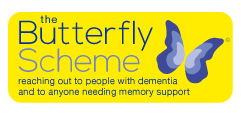You may have heard the excellent news this month that a drug has been found to significantly slow the progression of Alzheimer’s Disease in people diagnosed early. This is a breakthrough we’ve all been waiting for and promises great hope for the future. The issue, of course, is getting that early diagnosis. Resources are currently inadequate to the task and yet quality of life is very much at stake, not only for people developing the disease, but also for the people around them.
The Butterfly Scheme will be playing its part in helping people get onto that diagnosis pathway. Let me explain.
Whilst the Scheme was initially designed to support people living with known dementia, it soon afterwards began to include people who clearly had a similar care need, yet had no diagnosis. That’s of only temporary use, of course, if the person then leaves hospital without any further action being taken. However, what we’ve always done and will continue to do is to alert the person’s GP via the discharge letter that this patient has been making use of the Scheme whilst in hospital and should be considered for a dementia assessment. Many, many people have entered the diagnosis pathway that way and, if diagnosed, have then been able to access whatever support is available. In future, though, that action could make an enormous difference to the person’s chances of accessing their diagnosis in time to benefit from the new drugs.
Thank you to all the staff teams who actively ensure that the care continues after a patient with dementia-like care needs leaves their hospital or community list; the difference you make could from now on be the most significant ever!
